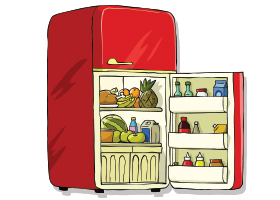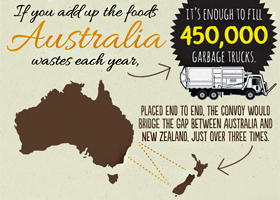
Storage
Knowing the best ways to keep and store your food is absolutely vital to ensuring you’re making the most of it.
By getting the basics right on how to store your food efficiently, it’s easy to break bad habits and reduce the amount of food you’re throwing out each week.
The challenge, of course, is learning to recognise what might be going wrong in your kitchen, and taking simple steps to put solutions into action. And when we say “solutions”, we mean anything from investing in clear storage containers and keeping a junk-free fridge to making sure all your lids are secured at the end of the day. Dead simple we know, but you’d be surprised how much can be lost by simple household mistakes.
We’ve put together a series of simple, practical tips on how best to store and save on each of your weekly shopping list items.
By putting in just a little effort, these can help you save on the nearly $1000 worth of food waste thrown out by Australian households each year.
Dairy
- Cheese – if you buy large economy blocks of cheese, cut them into smaller blocks and freeze, or grate and freeze to avoid the uneaten parts going mouldy. Rewrapping your fridge-stored cheese in foil helps lock in the freshness.
- Milk – If you have too many bottles or half-bottles, freeze while still fresh so milk is always available later. Same with yoghurt.
- Yoghurt – leftover yoghurt also works well in smoothies with your ripe fruit.
Fruit
The fruitbowl is a busy place. Leave it for what feels like a second, and already half your bananas are overripe and and your once peachy peaches have seen better days.
Three things to remember. Keep an eye on your fruitbowl, separate very ripe things from the rest and don’t forgot that just because a piece of fruit has gone past the ‘eat it fresh’ stage, does NOT mean it needs to be thrown out! Overripe fruit can be used for a huge number of other meals, desserts, sauces and treats. It’s all just a matter of having fun and getting creative.
- Bananas: best kept at room temperature, preferably away from other fruits and in the bag in which you bought them.
- Apples: refrigerate apples in plastic airtight containers to help them stay fresh longer.
- Grapes: they’re best stored in the packaging in which you bought them in but they should be refrigerated. Grapes can also be frozen and eaten as iced treats.
- Kiwi fruit: store them in the fridge for maximum freshness.
- Melons: should be refrigerated to maximise their shelf-life. Chop melons into cubes and store in a container in the fridge or in the freezer for a healthy snack later.
- Oranges: store orange in a air-tight container in the fridge to keep fresh longer, and do the same for pears.
- Strawberries: should stay in their original cartons in the fridge.
- Pineapples: best kept unrefrigerated, but do keep out of direct sunlight and in a cool spot.
Vegetables
Where possible, it’s a great idea to store your salad ingredients in air-tight containers or your fridges veggie crisper. As well as staying fresher for days longer, you’ll know where to look for all your fresh foods and be reminded of what needs to be used up.
- Potatoes: best stored in a cool dark place, slightly above standard refrigeration temperature, in a container. Also keep onions in the dark. Chop extra when you need to use an onion, and freeze for later use.
- Greens: Revitalise fresh greens by placing them in ice cold water for 10 to 20 mins and then spin or dab dry.
- Broccoli: keep it chilled in the veggie compartment of your fridge in its original bag.
- Carrot: keep it in a container; wrapping them in kitchen paper first helps retain freshness. Slice nubs of carrot into rounds and pop into air-tight container to freeze. Put them straight into boiling water to cook.
- Herbs: did you know you can avoid accumulating wilted and blackened herbs at the bottom of your fridge, by freezing them – they’ll keep up to 6 months. Chop parsley and put in a container or bag in the freezer to add to your cooking anytime.
- Lettuce: wrap washed lettuce in a damp clean tea towel or paper towel and store it in a container in the fridge. Remove any brown leaves before storing.
- Mushrooms: best stored in the fridge in the paper bag that they came in or if in air-tight container, with kitchen paper tucked over it.
- Spinach: wash it in icy water, dry thoroughly and store in a container in the fridge to keep for longer. To store excess spinach, steam for a few minutes. Divide into containers and freeze – good for 6-12 months to add to soups, pasta, curries, stews, bakes.
- Tomatoes: chill tomatoes in the fridge and remove and bring to room temperature before eating. To freeze, remove stalks before freezing whole in a freezer bag. Take them straight from freezer to pot for pasta sauces etc (do not thaw first).
- Avocado: To save half an avocado, leave the seed in and store in the fridge to help it stay green longer.
- Capsicum: Bag capsicum and store in the fridge. If you only use part of it, store with seeds and pith to extend its life.
- Corn: Slice corn cobs into 3cm rounds, freeze in plastic airtight containers and when ready to cook pop them straight into boiling water
Odds and ends
- Lemon or citrus juice – freeze any leftovers for future use in an ice cube trays.
- Coconut milk – freeze leftovers in ice-cube trays. Once frozen, transfer to freezer bags. It will keep for up to 3 months.
- Nuts – these store well in the freezer in a air-tight container – keep that in mind at times of high nut consumption, like Christmas.
- Pasta – work out how much each person needs – about 90gm per person is a rule of thumb – and weigh it before you cook, or get to know how many handfuls per person, then store the rest in a plastic airtight container.





